South Australian computer manufacturer Allied hopes to increase production to over 100,000 laptops per year after signing a regional manufacturing deal with Google that will see SA’s Labor government first piloting the locally-made Chromebooks for students across the state, before considering whether a further rollout is warranted.
The partnership – the first of its kind in the Australia/New Zealand market – will see Allied given access to Google intellectual property and design standards that will allow it to deliver its first 60 Chromebooks in time for the start of Term 1 at the end of January.
Those systems will be trialled by the South Australian Department of Education at Cleve Area School and Murray Bridge High School, where they will be evaluated for suitability within the classroom environment before Allied potentially ramps up production to become the first supplier of locally made Chromebooks to schools across ANZ and beyond.
Allied – which has already built up a global market for high-spec machines for gamers and specialised applications for Australian and US-based defence, space, healthcare and other firms – manufactures its devices from three facilities in Adelaide’s western suburbs.
Supporting the Google partnership could see the company add up to 500 local jobs as it ramps up production in a move that Allied CEO Aron Saether-Jackson called “a game-changer for Allied.”
“A lot of people think there isn’t much of an opportunity for high-tech computer manufacturing in Australia,” he said, “but partnerships like this prove the doubters wrong.”
“With this partnership, Australian governments will have the option to buy superior laptops that are locally manufactured, at competitive value.”
A new approach to student laptops
Local computer manufacturing has been in a slump since surging costs drove IBM to sell its once thriving Wangaratta, Victoria PC assembly factory to local operators Bluegum– which subsequently sold the site to US company Selectron, which closed the plant for good in the early 2000s.
Although Australian customers are projected to buy some $2.16 billion ($US1.46 billion) worth of laptops in a PC market that will be worth $3.44 billion ($US2.32 billion) this year alone, Allied ranks among a handful of Australian companies – others include Leader Computers and Venom Computers – that are still manufacturing the devices locally.
In this context, Allied’s “ground-breaking” Google contract win is “a huge vote of confidence” in a state manufacturing base that, SA Premier Peter Malinauskas said, could get a shot in the arm if the initial trial of locally made Chromebooks proves that the devices “are fit for purpose and can withstand the rigours of the classroom.”
“It’s an exciting prospect to think there is potential for devices manufactured here to become a viable option for our South Australian schools and indeed for schools across the country,” Malinauskas said.
Laptop policy in South Australia has been a case of swings and roundabouts in recent years, with the state’s Year 12 students the first in the country to sit an end-of-year exam on laptops in 2018 – months after the incoming government of Liberal Steven Marshall axed a $70 million Laptops for Students program promised in that year’s budget by Jay Weatherill’s previous Labor government.
The return of Labor last year, however, has revived interest in school laptop strategy and the new Google deal will catalyse decision-making with a deal that, SA Minister for Trade and Investment Nick Champion said, “will create more jobs and help train more skilled workers.”
Despite scattered bans of the devices on privacy grounds in countries like Denmark and Germany, Google – which last October updated its Chromebook strategy with a new Chromebook Plus reference design with full HD screen and webcam and twice the power, speed, memory, and storage in devices priced from $592 ($US399) – claims that more than 50 million Chromebooks are already in use by students and teachers around the world.
Countries like Taiwan and, more recently, India have sought to establish themselves as key Chromebook manufacturing partners – and the addition of Australia to the mix, Google for Education director Colin Marson said, “will help students and teachers continue on their collaborative learning journey.”










